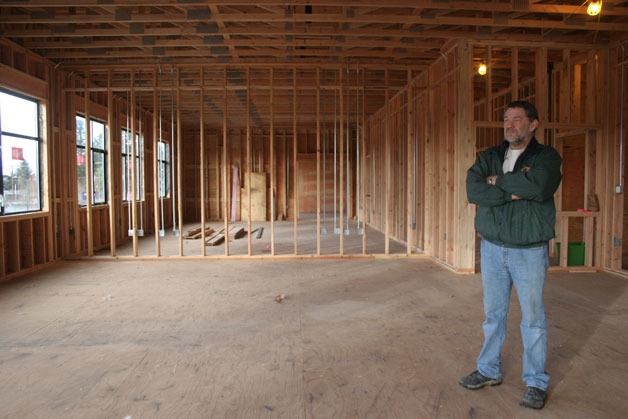FREELAND — Construction is well along on a new retail-office building in Freeland on the former site of South Whidbey’s only bowling alley, owner-developer Steve Myers said Monday.
Myers said the project is more than half complete, and he expects the new building along Harbor Avenue just off Highway 525 to be ready for occupancy in June.
“Construction has been really smooth,” he said.
“Amazingly, it looks like the architect’s drawing,” he added with a chuckle.
Myers’ company, Sound Electric, is building the new two-story structure in a style to complement his two other buildings next door, at Harbor Avenue and Main Street.
The new building, expected to cost about $2.2 million, will include space for three retail businesses on the ground floor, with four office suites above, Myers said. The architect is Carlos Sienna Martin of Bellevue.
The 10,800-square-foot structure is on two lots previously accommodating the bowling alley. The building also will have an elevator and a coffee shop.
Myers said it will be a “green” building with solar panels on the roof to heat water, and a 1,700-gallon tank beneath the ground to catch rain runoff for irrigation and other water recycling.
There will be parking for 40 vehicles, and Myers is considering making six of the spaces plug-in stations for electric cars.
He said the work is being done by subcontractors, most of whom are from Whidbey Island, although glazing, some storefront work and masonry are being done by off-island firms.
“We were trying to get as many local people as we could,” Myers said. “But we had trouble getting some pricing from local people. I don’t understand why. Maybe they were too busy.”
Myers said he is negotiating with three potential tenants, and that he’s concentrating on local businesses that are looking for a new start.
“In a down economy, businesses tend to shift to better locations, to get away from their dead-end streets,” he said. “You can see that in Freeland.”
Myers unveiled his plan for the new building in 2008, and he demolished the bowling alley in the fall of 2009. He didn’t begin construction until late 2010, however.
“The economy caused the delay,” Myers said. “Not that it’s any better now, but I also was working on other projects and didn’t have the time to devote to it.”
Myers said he bought the property nearly four years ago with the idea of keeping it as a bowling alley until he could redevelop it.
But Freeland Lanes, one of the few recreational venues on the South End, closed in June 2008 because the cost of insurance, the rising expense of real estate and other operating costs outstripped revenue.
At one point, avid bowlers collected petition signatures to send to elected officials urging that something be done to keep the alley open, to no avail.
“It’s one of those things,” Myers said. “The whole demographic has changed.”
He said most island households spend more time than they used to working and commuting, not to mention fiddling with digital devices.
“It’s difficult to have the energy at the end of the day to go out and enjoy a family sport,” he said.
Portions of the old bowling alley live on, however. Myers said he donated much of the equipment for reuse, and part of the lanes will make up the floor of the coffee shop.
Myers and his family have been residents of South Whidbey since 1960. He started Sound Electric in 1992, and currently employs five.
Myers said the economy shows signs of emerging from the recession, even on Whidbey, which entered the downturn late. He said Freeland is well positioned to take advantage of an upswing.
“This is still a tough economy, but it will pick up,” he said.
Myers said Freeland provides more tax revenue than Langley and Coupeville combined.
“Freeland is the business center of South Whidbey, and it has been for years,” he said. “If you’re looking for a successful place to be, Freeland will be it.”
“I just see a huge opportunity for Freeland to grow, whether sewers go in or not,” he continued. “But I believe sewers will go in — it only makes sense.“
And he added: “Consolidation won’t be far behind.”



